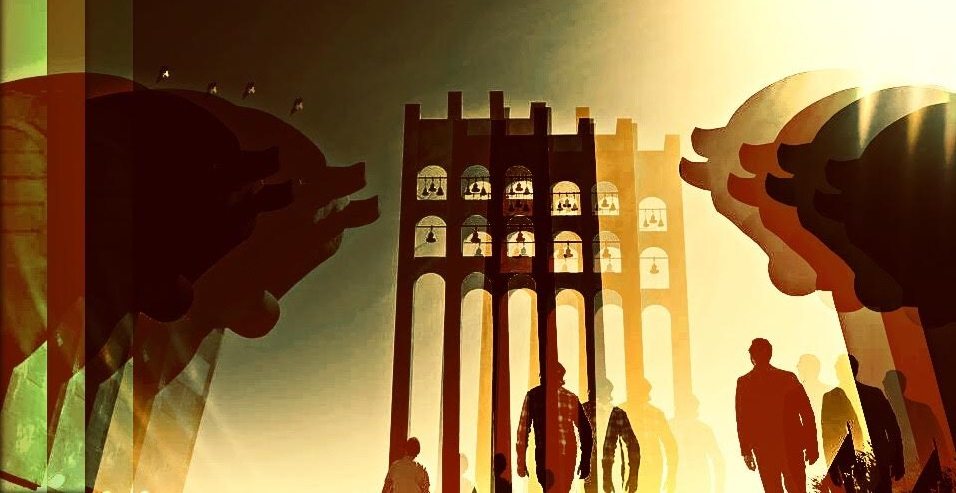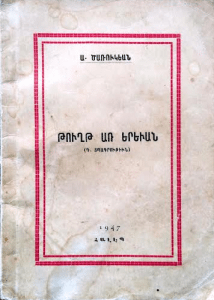Letter to Yerevan (Part I)
May 28, 2017On the occasion of the 99th anniversary of the establishment of the First Republic of Armenia (1918-1920), the Armenian Weekly is pleased to announce that it will be periodically publishing the English translation of Andranik Tzarukian’s epic 1945 poem “Tught ar Yerevan” (“Letter to Yerevan”).

The Armenian Weekly is pleased to announce that it will be periodically publishing the English translation of Andranik Tsarukian’s epic 1945 poem ‘Tught ar Yerevan’
The translation, which will be published in parts and culminate on the Centennial of the First Republic of Armenia, is a collaborative effort between the editor of the Armenian Weekly Rupen Janbazian and former editor of the Armenian Review and former director of the ARF and First Republic of Armenia Archives Tatul Sonentz-Papazian.
***
In 1944, Soviet Armenian writer Gevorg Abov wrote a poem entitled, “Menk Chenk Moratsel” («Մենք չենք մոռացել» – “We Have Not Forgotten”). In his poem, he criticized the Armenian Revolutionary Federation (ARF) and its entire membership for being traitors of the Armenian nation and its people. He particularly critical of the First Republic of Armenia (1918-1920) and its leadership.
“Menk Chenk Moratsel” touched a nerve with renowned Armenian author Andranik Tzarukian. His response to Abov came in the form of a lengthy, powerful poem entitled, “Tught ar Yerevan” («Թուղթ առ Երեւան» – “Letter to Yerevan,” 1945).
Although Abov had addressed his poem to the entire ARF, Tzarukian felt it was his responsibility to respond and to disclaim Abov.
Written in Aleppo and first published in 1945,“Tught ar Yerevan” examines at the history of the ARF and aims to dismiss Abov’s claims that the organization harmed the interests of the Armenian people. Almost overnight, Tzarukian became a dominant voice in Armenian life, and his poem quickly spread through the Armenian Diaspora, from the Middle East to Europe and the Americas.
Seventy years after it was written, “Tught ar Yerevan” continues to be considered one of the most influential historical poems in modern Armenian literature.
Below is the first installment is dedicated to the 99th anniversary of the First Republic of Armenia.
***
Letter to Yerevan (Part I)
In this late autumn night,
Through the whimpering wind
And the thin, trickling rain,
Behold,
A groping, grieving boy.
He walks on damp, dank grounds,
His head down with sorrow
And in the dark depths of his soul
A wave of grief pounds like a heavy
Hammer …
He walks on the damp, cold concrete
Alone, without a friend,
His idle hands in his pockets,
As if on his weary shoulders
Lies an invisible cloak of lead,
An evil deity’s dark curse,
The fateful, immense fist
Of misfortune…
In the thunderous depths
Of his eyes,
A remote sense of yearning,
Like a dying, fluttering bird. A prayer
Flung at the distant spring,
A tormented thought
Of blue mountains and bright suns.
An unreachable sense of longing
For homeland.
He dreams of his country
Like a mother missing a child,
Like a parched land missing rain,
Like shivers yearning for sun.
Like a dying crane clinging on
To dear life,
He dreams of his country.
Oh, there are pulsating hearths there
And joyful sounds of song
And laughter,
The beguiling life
Of regeneration of seeds
Bursting from beneath the soil,
And thousands upon thousands
Of children,
With dreamy eyes,
Smiling bright at a beckoning haven.
With the sense of yearning deep
In his heart
And the dazzling dream in his eyes,
In the fading shadows of autumn,
Under the thin, trickling rain,
He is but a shivering, wavering
Shadow.
Who is he? A wandering,
Abandoned boy…
What is he? A floating fragment
Of a capsized ship…
Where is he? On alien and
Bastard lands…
What does he have? No father, no shelter,
Not a child,
Not a single sliver of land
In this wide world,
Nowhere under the sun
To call home…
In constant struggle to find
His daily bread,
He has nothing, except
Dread…
Source: Armenian Weekly
Link: Letter to Yerevan (Part I)
